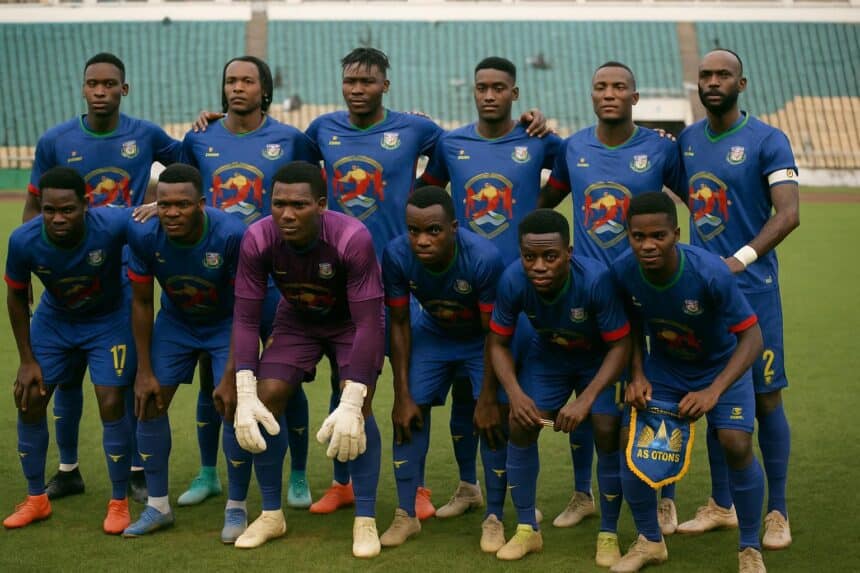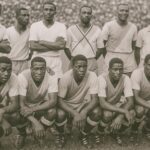Brazzaville crowd erupts as dream lives on
Sunday evening in Brazzaville, the final whistle at President Alphonse Massamba-Débat Stadium triggered red-and-blue smoke and vuvuzelas. AS Otohô’s goalless draw against Angola’s Primeiro d’Agosto was enough to seal passage to the CAF Confederation Cup second preliminary round, prompting hugs between players and police stewards.
The qualification felt like more than a sporting footnote. Otohô retained Congo’s flag in continental competition after the early exit of AC Léopards, and gave supporters a welcome tonic amid rising living costs and electricity rationing that have dominated conversation in the capital this month.
Behind the dug-out, new Malian coach Sékou Seck exchanged a discreet fist bump with club president Maixent Raoul Ominga. Hired only in July, Seck had promised pragmatism. Delivering a ticket to the next round after just three competitive matches exceeded even his own cautious projections.
Seck’s early impact already visible
Speaking to reporters, Seck warned against premature celebration. “The real work starts now,” he said, stressing recovery sessions and video analysis. According to Congolese daily Les Dépêches de Brazzaville, the 48-year-old spent the international break sleeping inside the training centre to study opponents’ data.
The coach’s discipline rippled onto the pitch. Facing an Agosto side that switched to a crowded 4-5-1, Otohô’s double pivot stayed patient, often clearing long rather than forcing intricate passes. Centre-backs Ngouabi and Bidimbou intercepted twelve crosses, an efficiency highlighted by CAFonline’s post-match statistics.
A chess match decided in midfield
In truth, the match could have tilted earlier. On 44 minutes, striker Junior Makiesse won a penalty after muscling past two defenders. His attempt, however, sailed over the bar and into the choir stand. The miss drew a collective gasp but did not derail the defensive blueprint.
Goalkeeper Christoffer Mafoumbi, signed on loan from Bulgarian side Beroe, marshalled his box confidently and recorded four saves, including a reflex stop from Carlinhos’s late header. “The coach told me to be vocal, to own the six-yard area,” the 29-year-old recounted after the final whistle.
Club chairman Ominga, also head of the national oil company, praised the squad’s temperament and hinted at travel subsidies for the next away leg. His comments resonated with fans from Oyo to Makoua, many of whom pooled money last week to afford streaming subscriptions when local networks buffered.
Ferroviario test looms in Maputo
Attention now shifts to Mozambique. Otohô travel to Maputo on 18 October to face Clube Ferroviario, a side renowned for swift wide play and humid conditions at Estádio da Machava. Seck has already requested evening kick-off to mitigate heat, Ferroviario officials confirmed during Monday’s coordination call.
The draw means the Congolese will host the return leg in Brazzaville a week later, only one step from the lucrative group stage that guarantees at least US$400,000 in prize money. For a club whose annual budget hovers around US$1.8 million, that purse would be transformational.
Sports economist Auguste Mvoula notes that continental bonuses often trickle into local economies through bonuses, merchandising stalls and moto-taxi rides on match day. “Every extra round means several hundred temporary jobs,” he explained, pointing to studies conducted after Diables Noirs reached the quarter-finals in 2022.
Leopards stumble as Bulls charge
While Otohô celebrated, AC Léopards supporters experienced the cruel flip side of knockout football. The 2012 CAF Confederation champions were eliminated in Maputo by Black Bulls after two goalless draws. Missed penalties from veteran stand-in captain Tychique Mfoumbi proved costly during the 4-3 shoot-out defeat.
Coach Barthélemy Ngatsono admitted frustration but insisted the Niari outfit, heavily backed by the city’s timber industry, would redirect resources toward the national league. The early exit could free calendar space, giving the country’s technical staff a wider talent pool for November’s FIFA World Cup qualifiers.
Why continental runs matter at home
From barbershops in Talangaï to WhatsApp groups abroad, talk now centres on whether Otohô can emulate Diables Noirs’ deep run or even go further. Former Red Star defender Rolf Ngalai thinks so, arguing that the current squad mixes raw athleticism with newfound composure under Seck.
Congo Football Federation vice-president Jean-Gaston Elion stresses the broader consequence. “Every clean sheet on the continent boosts our coefficient, which affects future seedings,” he said, encouraging supporters to fill the stands and respect security protocols recently updated by authorities after stadium renovations.
Local authorities confirmed additional buses will run from Poto-Poto and Moungali on match days, reflecting a policy that couples sports promotion with mobility improvements. Ticket prices are expected to stay frozen at 2,000 FCFA for terraces, a decision welcomed by university students interviewed outside Marien Ngouabi campus.
How to follow the Maputo showdown
Supporters unable to travel can catch the Maputo leg on national television after Télé Congo secured sublicensing rights. Analysts expect viewership to surpass the 1.4 million who watched Diables Noirs’ quarter-final in 2022, underscoring football’s unmatched power to unite Congolese screens and streets.





















